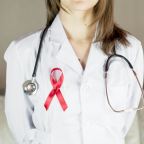
Pledge to go red for HIV Testing Week
People across Plymouth are being urged to pledge to go red for HIV Testing Week (22-30 November 2014) and World AIDS Day (1 December 2014)
The Eddystone Trust, the local HIV and sexual health charity, and Plymouth City Council which is the strategic lead for Public Health in the city have joined forces to promote better HIV awareness in the city.
There are an estimated 107,800 people in the UK living with HIV and it is estimated that one in four are unaware they have the condition.
The aim of HIV Testing Week is to increase HIV testing in community and statutory settings to improve early diagnosis and treatment of HIV (and reduce ongoing transmission among those most at risk).
Throughout HIV testing week, Eddystone Trust will be carrying out HIV testing in a range of community settings across the South West. Click here for more details.
Councillor Sue McDonald, Cabinet Member for Public Health said: “Everyone needs to look after all aspects of their health, and sexual health is no exception.
“It is vitally important that everyone practices safe sex and is tested regularly, although the national campaign focuses on men who have sex with men, and African men as nationally there is a greater prevalence of HIV in those groups.
“But HIV can affect anyone – young, old, black, white, gay or straight, rich or poor – and we want as many people across Plymouth to pledge to wear a red ribbon and support HIV Testing Week and World AIDS Day as possible.”
Mags Davies, Director of the Eddystone Trust said: “We aim to promote and increase HIV testing in all areas – look out for the national ‘It Starts With Me’ campaign which we are supporting and also our own local ‘Keep Calm and Wear One’ promotional materials.
“We want to expand rapid HIV testing across the South West, work with faith organisations on testing and HIV, promote and increase professionals access to training and seminars on the topics of sexual health and HIV, and we’ll be promoting the campaign on social media. We also want you to pledge to wear a red ribbon.
“It is better to test sooner than later and don’t forget – testing early means that treatment is more likely to be successful.”
Eddystone have also launched WADvent – a World AIDS Day Calendar using a series of social media messages throughout November with information on a range of topics related to HIV and AIDS.
Dr Kelechi Nnoaham, Director of Public Health said: “Nearly a third of new cases of HIV diagnosed in our city are diagnosed at a late stage in the illness. Earlier diagnosis means that a person can get earlier treatment which in turn increases their likelihood of a healthier and longer life.
“Ultimately though prevention is better than cure and I would urge people to always practice safe sex by using a condom correctly.”
You can register your pledge to wear a red ribbon and make a donation to support World AIDS Day and HIV Testing Week here: http://www.redribbonpledge.co.uk/
For more information on the Eddystone Trust go to www.eddystone.org.uk or call 0800 3283508.
Further detail is also at www.plymouth.gov.uk/hiv
Events are taking place throughout Plymouth:
• Thursday 27th November – HIV Rapid Result HIV Testing at Eddystone Trust, 11 Whimple Street, Plymouth, Pl1 2DH, from 5.30pm to 7.30pm
• Monday 1st December – Vigil organised by Pride Plymouth at Drake Gardens, North Hill, from 6.30pm to 8pm.
• Eddystone Trust will also be doing outreach testing at pubs, bars and clubs in Plymouth throughout the week and at Manticore Spa.
There will also be stalls and events in schools, colleges, universities and other community settings throughout the week.
Facts about HIV:
• 42% of people diagnosed with HIV in 2013 had a late diagnosis
• People diagnosed aged 50 years or above were more likely to be diagnosed late than those diagnosed aged under 50 years (58% compared to 39%).
• Early screening, diagnosis and treatment give you a much better life expectancy.
• 1 in 10 new infections come from people recently infected.
• One in 665 people in the UK have HIV.













